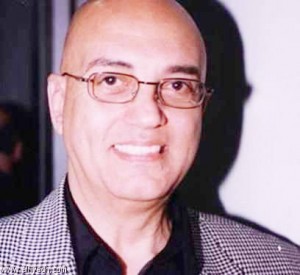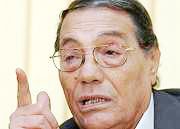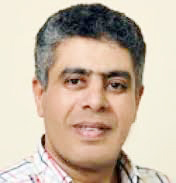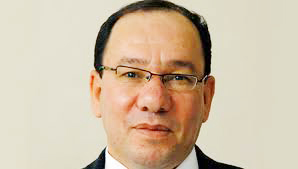After the national dialogue session came out with a list of recommendations on how to ensure transparent and free elections, several writers have criticised the talks arguing that a meeting as such should have better been held with the head of the Supreme Electoral Commission (SEC). Other writers explored the issue of the Muslim Brotherhood’s electronic militias and John Kerry’s visit to Egypt.
Scandalising the electronic militias
Mohamed Salmawi
Al-Masry Al-Youm newspaper
Salmawi explores the issue of electronic militias, a group of Muslim Brotherhood youth who are assigned to target certain Egyptian intellectuals and writers and attack them electronically. Although the writer has written about this topic several times before, he states that this time he has known about an investigative report published in Al-Sabah newspaper in which a reporter has unveiled the truth behind these electronic militias.
Salmawi recalls a member of these electronic militias visiting him in his office, telling him that he was once a member of these ill-mannered groups. He came to the writer to give him more information about these groups and how they operate.
Salmawi, however, did not believe him until he read the in-depth story published in Al-Sabah. The writer condemns how the Islamist group creates such electronic militias to attack certain liberals through offensive statements and odious terms. He states that as time goes on the scandals of the Muslim Brotherhood will become more apparent to the public, and that their disgraceful actions will prove that their actions cannot be justified by religion.
Concluding his column, Salmawi states that the purpose of narrating this incident is to prove that many people who have once belonged to the Muslim Brotherhood are gradually starting to understand that they have been brainwashed by the group’s poisonous ideology.
The presidency’s fake thoughts
Salah Eissa
Al-Masry Al-Youm newspaper
Recalling the four-hour dialogue session hosted by the presidency last week to discuss the guarantees of holding free and transparent elections, Eissa chides those who participated in the meeting, believing that nothing from their long list of recommendation will be taken seriously by the president. He argues that the presidency has nothing to do with the actually proposals and will not interfere in implementing any of the suggested ideas.
Eissa believes that the head of the Supreme Electoral Commission (SEC), not the president, should have spearheaded the dialogue by inviting the heads of the political parties and prominent public figures for talks regarding the integrity of the upcoming parliamentary elections.
He criticises those who attended the long meeting stating that they wasted their time and energy over useless talks. Praising those who apologised for attending the dialogue, Eissa said they were smart enough to understand that the presidency’s dialogue sessions are meaningless.
Although the presidency has confirmed that this particular session is to discuss transparency and integrity to elections, and is independent from the earlier eight dialogue sessions, it is hard to believe that the upcoming parliamentary elections will enjoy even the minimal amount of transparency.
Does the National Salvation Front have a plan B?
Emad Al-Din Hussein
Al-Shorouk newspaper
After receiving a long comment from one of his readers on Facebook asking if the opposition groups are sure enough that their decision to boycott the elections is fully correct, Hussein asks the National Salvation Front (NSF) if they ever thought of a plan B after deciding to boycott the marathon.
Hussein believes that one of the basic rules of political games is to participate rather than to abstain. Therefore, he calls upon his friends in the NSF to think twice about boycotting the elections. He warns that leaving space for the Muslim Brotherhood and the remaining Islamist political parties will help them to easily dominate the political sphere.
Hoping that the front would soon change its mind, Hussein believes that almost all political decisions are vulnerable to change according to the rapid political developments. He refers to the tense relation between the Muslim Brotherhood’s Freedom and Justice Party and the Salafi Al-Nour Party despite the fact that both belong to the Islamic movement.
He reminds the opposition of the Israeli invasion in Palestine and warns them that Ikhwanisation would probably invade Egypt like the Israeli aggression if the NSF did not stand and fight. To conclude, Hussein advises the NSF to think of the consequences of their move to shun the elections.
Egypt is politically unemployed
Wael Qandil
Al-Shorouk newspaper
Regarding the United States Secretary of State John Kerry’s visit to Egypt and the upcoming parliamentary elections, Qandil chides the US official for interfering in the country’s internal affairs. He also censures the Egyptian government and opposition for failing to fairly stand on acceptable political stances.
The writer states he wishes that the concerns related to the parliamentary elections to have come out of the Egyptian government itself rather than American officials visiting the country to make their statements and teach us how to play politics.
He states that Egypt’s political scene suffers from double standards. Amid calls to push out the armed forces from politics, we find slogans that call for the importance of having the military engaging again in the game.
In times when American officials pay visits ahead of important occasions, like parliamentary elections, Egyptians chant against foreign intervention. Qandil finally assesses Egypt as a politically unemployed country, a state lost between too many contrasts.







